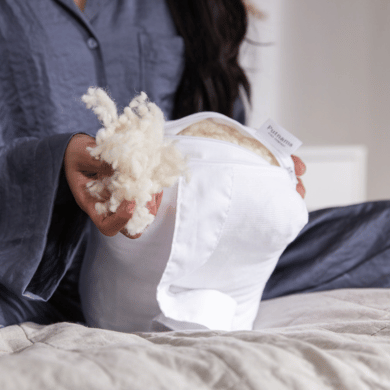
Sleep and Creativity: Why Rest Fuels Original Ideas
Have you ever woken up with the solution to a problem that seemed impossible the night before? Or had a brilliant idea strike you in the hazy moments just after your alarm goes off? If so, you're not alone. The link between sleep and creativity isn't just a coincidence; it's a powerful neurological process that artists, scientists, and innovators have tapped into for centuries.
Paul McCartney recalls the birth of 'Yesterday' - In a 1998 interview with author Barry Miles for the biography Many Years From Now, he shared, "I woke up with a beautiful tune in my head and thought, ‘That’s great, but what is it?’ With an upright piano by the bed, I sat down, played a sequence, G, F sharp minor 7th, B, E minor, and back to E and it all flowed naturally. I loved the melody but doubted I’d written it since it came to me in a dream."
This blog post explores the science behind why rest is essential for fuelling original ideas.
We will examine how different sleep stages, especially REM sleep, help your brain connect distant concepts and solve complex problems.
You will also learn how sleep deprivation can stifle innovation and discover actionable habits to improve your sleep quality. By understanding this connection, you can learn how to use sleep to boost creativity and unlock your full potential.
The Science Linking Sleep and Creativity
For a long time, sleep was seen as a passive state, a simple shutdown period for the body and mind. We now know this couldn't be further from the truth. While we rest, our brains are hard at work performing critical functions that are vital for learning, memory, and, importantly, creative thinking. Brain creativity and sleep are intrinsically linked through a process of memory consolidation and reorganisation.
During the day, our brains are busy absorbing vast amounts of information. At night, sleep helps to process and store this information.
As Alex Soojung-Kim Pang, author of Rest: Why You Get More Done When You Work Less, explains, when our minds are in a relaxed state, our subconscious keeps working on problems. This allows it to "explore different combinations of ideas, to test out different solutions."
That "Aha!" moment you experience is often the result of your brain's overnight labour.
This process involves forging connections between seemingly unrelated ideas. A 2007 study by neuroscientist Matthew Walker found that after a night's sleep, participants were significantly better at finding these "remote associates" than those who stayed awake. This research highlights how sleep helps problem-solving by giving the brain the time it needs to form novel connections that our rational, waking minds might miss.
Why Poor Sleep Blocks Imagination
Just as quality sleep can fuel innovation, a lack of it can bring your creative engine to a grinding halt. Sleep deprivation impairs a wide range of cognitive functions essential for creativity, including attention, emotional regulation, and flexible thinking. Whilst for many it seems sleep and imagination are obvious bedfellows, it isn't always the case, but the science seems to agree that sleep and creativity often go together.
When you're tired, your brain's prefrontal cortex, the region responsible for executive functions like planning and decision-making, struggles to operate effectively.
This leads to several issues that block creativity:
- Rigid Thinking: A tired brain tends to fall back on familiar, straightforward solutions. It struggles to think divergently or consider unconventional approaches, which are the cornerstones of creative thought.
- Negative Mood: Lack of sleep can lead to irritability and increased stress, creating a negative mental environment where creativity cannot flourish. As research confirms, sleep deprivation often leads to negative thinking patterns that stifle new ideas.
- Impaired Memory: Without adequate rest, your brain's ability to consolidate new memories is severely hampered. This means you can't effectively integrate new knowledge with existing information, which is a key part of the creative process.
In short, when you neglect rest, you are not just making yourself tired; you are actively limiting your mind's ability to innovate and create. Creativity and rest go hand in hand, and it's important to prioritise both in order to reach your full potential.
The Role of REM in Problem-Solving
So, why does sleep improve creativity so effectively? And how sleep helps problem-solving is not always obvious.
Much of the magic happens during a specific stage of sleep: Rapid Eye Movement, or REM. This is the stage most associated with vivid dreaming, and it appears to be a hotbed for creative thought. So how REM sleep fuels original ideas is the subject of much study recently.
REM directly enhances creative processing more than any other sleep or wake state.” - Dr. Sara Mednick
During REM sleep, the brain experiences heightened activity, similar to when it's awake. However, the chemical environment is different. Levels of norepinephrine, a stress-related chemical associated with focused attention, are significantly lower. This reduction allows the brain to make broader, more unusual connections between memories and ideas.
It's during this time that your brain can link a recent challenge with a distant memory, leading to a breakthrough insight. REM sleep ideas are often the product of this unique neurochemical state, where the brain is free to explore without the constraints of logical, waking thought.
Research has shown that REM sleep enhances the integration of unassociated information, which is crucial for creative problem-solving. This is why many people, from artists like Salvador Dalí to musicians like Paul McCartney, have credited dreams with providing the inspiration for their greatest works.
Habits That Support Creative Rest
Understanding the link between sleep and imagination is one thing; actively using it to your advantage is another. To harness the creative power of sleep, you need to prioritise getting consistent, high-quality rest.
Here are a few habits you can adopt to do just that:
1. Maintain a Consistent Sleep Schedule
Going to bed and waking up at the same time every day, even on weekends, helps regulate your body's internal clock. This ensures you cycle through all sleep stages, including the crucial REM stage, more efficiently.
Consistency is key to unlocking the full restorative benefits of sleep.
See also - Sleep Biorhythms: How to Work With Your Body’s Natural Clock
2. Create a Sleep-Friendly Environment
Your bedroom should be a sanctuary for rest. This means keeping it dark, quiet, and cool. Blackout curtains, a white noise machine, or earplugs can help minimise disruptions. It is also important to remove electronic devices, as the blue light they emit can interfere with melatonin production, the hormone that signals to your body that it's time to sleep.
See also - Screens, Sleep and the Mind: How to Unplug the Right Way Before Bed
3. Journal Before Bed
If you're wrestling with a problem, try writing about it before you go to sleep. This practice, known as "dream incubation," can prime your subconscious to work on the issue overnight. You can also keep a dream journal by your bed to jot down any ideas or images that come to you upon waking, capturing those fleeting insights before they disappear.
See also - Sleep and Storytelling: Why Bedtime Rituals Still Work for Adults
Products That Help Unlock Deeper Sleep
Creating the perfect sleep environment often comes down to comfort.
If you are constantly tossing and turning, you are not giving your brain the uninterrupted rest it needs for creative consolidation. Investing in quality bedding can make a significant difference.
At Putnams, we design products specifically to enhance sleep quality.
Our ergonomic pillows provide optimal support for your neck and spine, reducing discomfort and promoting deeper, more restorative sleep. For those who suffer from acid reflux or need to sleep in an elevated position, our bed wedges offer a comfortable and effective solution, ensuring you can rest without interruption.
Furthermore, the materials you sleep on matter.
Our breathable bedding helps regulate body temperature throughout the night, preventing overheating, which is a common cause of sleep disturbances. By ensuring your body is comfortable and supported, these products help you achieve the uninterrupted, deep sleep necessary for your brain to perform its creative magic.
See also - Sleep and Storytelling: Why Bedtime Rituals Still Work for Adults
Your Next Big Idea Awaits
Sleep is not a luxury; it's a fundamental pillar of a productive and creative life.
By embracing rest, you are giving your brain the tools it needs to sort through information, make novel connections, and generate the innovative ideas that drive success. Whether you're a student preparing for exams, an entrepreneur building a business, or an artist working on your next masterpiece, quality sleep is your secret weapon.
Start tonight by implementing one of the habits discussed.
Unlock Creativity Like Steve Jobs: 5 Key Tips
- Dream Journal: Write down dreams immediately; they’re packed with creative insights.
- Mindfulness: Meditate to quiet your mind and spark innovation.
- Lucid Dreaming: Learn to control dreams and tap into creativity while you sleep.
- Hypnagogia: Capture ideas during those drowsy, pre-sleep moments.
- Feed Your Mind: Explore new experiences and let your subconscious remix them into fresh ideas.
Dream big, think different, and let your creativity flow!
Pay attention to your sleep environment, establish a routine, and give your mind the downtime it deserves. Your next breakthrough idea could be just a good night's sleep away.
















Leave a comment